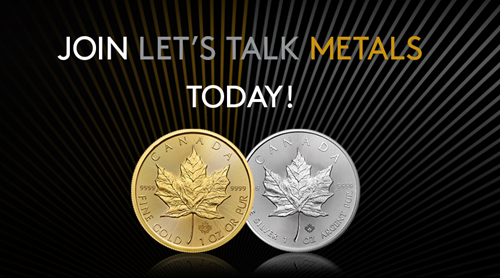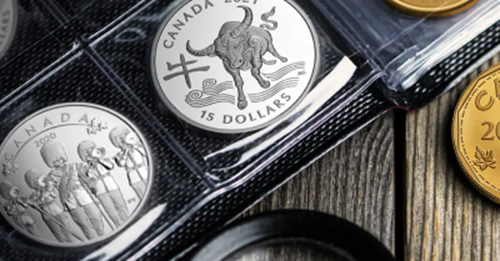4 Questions to Consider When Buying Gold Online
- Feb 20, 2025
- loveGOLD
- 4 minute read
The rise of digital commerce has made it easier and more convenient to buy just about anything from the comfort of your own home — including gold.
But as with any investment, there are thoughtful considerations that need to be made before buying gold online. Joseph Cavatoni, Senior Market Strategist for the Americas at the World Gold Council, says the ease of buying gold online requires due diligence, but it can be a simple and safe process as long as you ask the right questions.
This blog shares insights from Cavatoni on some of the important factors to consider and questions to ask before making any gold purchases, especially online.
Note: The information contained in this article is current as of the date of publishing, is for information purposes only and should not be taken as financial advice.


Buying gold online can be a simple and safe process as long as you ask the right questions.
The rise of digital commerce has made it easier and more convenient to buy just about anything from the comfort of your own home — including gold.
But as with any investment, there are thoughtful considerations that need to be made before buying gold online. Joseph Cavatoni, Senior Market Strategist for the Americas at the World Gold Council, says the ease of buying gold online requires due diligence, but it can be a simple and safe process as long as you ask the right questions.
This blog shares insights from Cavatoni on some of the important factors to consider and questions to ask before making any gold purchases, especially online.
Note: The information contained in this article is current as of the date of publishing, is for information purposes only and should not be taken as financial advice.
Q1. WHAT ARE YOUR INVESTMENT GOALS?
Cavatoni says the first thing to think about is what you’re trying to accomplish with your purchase.
“There’s a lot of value in determining what you’re trying to achieve,” he says. “If your objectives are clear, the path toward achieving them becomes much easier to see.”
Cavatoni suggests considering how important the following elements are to you and your goals:
- Portfolio diversification: A more diverse portfolio may be better protected against some risks, as factors that affect some types of investments may not affect others.[1] Gold is often considered an effective way to hedge risks like inflation because, unlike equities, it has historically performed well in periods of financial turmoil. For example, in the last 20 years, gold outperformed most other major asset classes.[2]
- Collectability: Some types of gold may carry value beyond just their gold content, such as their aesthetics, rarity or history.
- Functionality: Gold jewellery can be worn and used, which may be appealing to some buyers.
- Return on investment (ROI): Some types of investments offer greater flexibility, which has in the past been shown to enhance ROI in some cases. For example, gold futures (agreements to buy or sell gold in the future at specified terms, including price, quantity, quality and date) give investors the flexibility to go either long or short on gold. However, it is important to note that ROI is not a guarantee following any investment.
- Risk level: Every investment, including gold, carries some risk. It’s important to decide how much risk you’re willing to take before making any decision.
- Asset liquidity: Gold is highly liquid, which is an important consideration if you want to be able to sell your investment quickly and easily.[3]
Once you understand what matters most to you and your investment goals, says Cavatoni, you can assess different gold products to determine how they serve your personal priorities.
Q2. WHAT EXACTLY ARE YOU BUYING?
Gold is available in many formats. Cavatoni says it’s important to know the form of the gold you’re considering so you can properly assess it against your personal criteria. For example, are you buying a physical product or a share in a gold-backed exchange traded fund (ETF)? If it’s a physical product, is it bullion (either coins or bars), a collectable or something functional like a piece of jewellery? Each of these has its own characteristics and performs differently as an investment, so be clear on exactly what you’re getting.
Storage is another important consideration. Will the gold be delivered to your home so you’re responsible for storing it, or will the vendor provide secure storage? In either case, what’s included in the cost? If it’s being stored for you, is it allocated (you own specific pieces of gold) or unallocated (you own a certain quantity of gold, but not any specific physical pieces)? Cavatoni says it’s vital that you fully understand whatever terms you agree to, so don’t be afraid to ask questions.
Q3. WHO ARE YOU BUYING FROM?
Gold can be a significant purchase, so Cavatoni says it’s important to do your homework to make sure you’re dealing with a reputable vendor. He believes the following questions are a good starting point for gathering the data you need to make an informed decision:
- Have you heard of the company? How long have they been in business?
- Do they follow any voluntary industry standards or self-certifying frameworks (e.g., accreditation with the Better Business Bureau, membership in the International Precious Metals Institute, etc.)?
- Where does their gold come from? Has it been responsibly produced and sourced? The standards landscape is complex, but there are initiatives underway, such as the Consolidated Mining Standard Initiative, that aim to unify and simplify global mining standards. In addition, World Gold Council member firms are required to operate in accordance with the Responsible Gold Mining Principles to uphold high environmental, social and governance (ESG) standards.
- Does the Royal Canadian Mint include them in their lists of authorized dealers?
- Are they recognized by the LBMA, CME or other similar organizations?
- Have they been cited or fined for any legal violations?
- Are they insured to protect both your gold and cash balances? If you are unsure, ask. All gold deliveries should be insured, including managed gold products.
- How will your investment and personal information be protected in the case of a breach or other incident?
- Do they provide regular financial and market updates, with frequent insights on the market, pricing and liquidity?
- Any sales pressure or sense of urgency. “They might tell you something like ‘the markets are moving fast so you have to make a decision now,’ but if it feels quick, that’s almost always a sign you should slow down,” says Cavatoni.
- Unrealistic promises. “If they’re telling you something will always go up or promising it will protect you, you should question it."
- Lack of clarity or transparency when answering questions. “If they can’t explain the difference between the price of gold and the premium they’re charging, that’s a concern.”
- Lack of responsiveness or difficulty reaching a live person. “You should be able to get clear answers to any questions you have.”
Q4. WHAT ARE THE COSTS?
Before you make any decisions, Cavatoni believes it is important to be well informed, asking as many questions as you need to fully understand all costs associated with your purchase. Your vendor should be able to provide clear, transparent answers about all costs, including at minimum:
- The current price of gold
- Any fees charged by the vendor, and what they’re for
- Sales commissions
- Premiums
- Any other costs, such as delivery, storage and insurance
THE BOTTOM LINE
The questions proposed by Cavatoni are important to ask, but they can’t make the decision for you. Every investor has their own desires and needs; something that’s a deal-breaker for you might be acceptable to someone else. If you’re thinking about buying gold, Cavatoni believes leveraging resources from organizations like the World Gold Council, LBMA, Royal Canadian Mint and other reputable sources that can provide education and information is a good place to start. That said, always consult your financial advisor before you make any investment decisions.
© 2025 Royal Canadian Mint. All rights reserved.
Disclaimers:
Some of the links to websites and references to documents provided are available in English only and are owned or operated by third parties. By accessing a third-party website and/or document you understand that they are independent from the Royal Canadian Mint (the “Mint”) and that the Mint has no control over the content of such third-party websites and cannot assume any responsibility for materials created or published by such third-party websites. In addition, a link to a third-party’s website or document does not imply that the Mint endorses the website, the data, information and/or the content of such website. It is your responsibility to ensure that you review and agree to terms and conditions applicable to such websites before using it. Please note that the Mint is not responsible for webcasting or any other form of transmission received from any linked website.
The information provided herein is intended for informational purposes only and is not intended to constitute investment, financial, legal, tax or accounting advice, and you should not rely on the information herein for such advice. Past performance, and historical trends are not indicative of future results. Many factors unknown to the Mint may affect the applicability of any statement or comment made herein to your particular circumstances, and this information does not take into account any investment objectives, financial situation or particular needs of any particular person. You should directly consult your financial professional or other advisors before acting on any information herein. The information and materials herein are provided with the understanding that the Mint is not acting in a fiduciary capacity. Nothing contained herein constitutes a solicitation, recommendation or offer for the purchase or sale of products or services of any kind whatsoever. Diversification does not guarantee any investment returns and does not eliminate the risk of loss.
The information provided herein may contain forward-looking statements which are based on current expectations and are subject to change. Forward-looking statements involve significant known and unknown risks, uncertainties and assumptions. A number of factors could cause actual results, performance or achievements to be materially different from any future results, performance or achievements that may be expressed or implied by such forward-looking statements. These statements are not guarantees of future performance and should not be relied upon as such. The Mint assumes no responsibility for updating any information, including forward-looking statements, contained herein.
Mint does not guarantee the accuracy or completeness of any information contained herein, nor does the Mint accept responsibility for any losses or damages arising directly or indirectly from the use of or reliance on this information.
Reproduction or redistribution of any of this information is expressly prohibited without the prior written consent of the Mint.
Any person accessing this information should also consult the Mint’s website Terms of Use | The Royal Canadian Mint.
[1] Investopedia, 2024, The Importance of Diversification.
[2] World Gold Council, The Case for Gold.
[3] World Gold Council, 2024, Gold as a Strategic Asset, 2024 Edition.


Let's Talk Bullion
Let's Talk Bullion
Explore more articles and videos related to precious metals and get answers to questions about gold, silver and platinum bullion.



